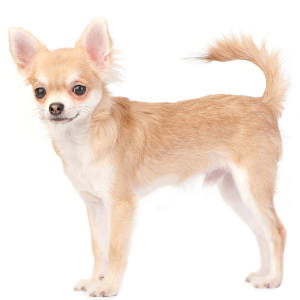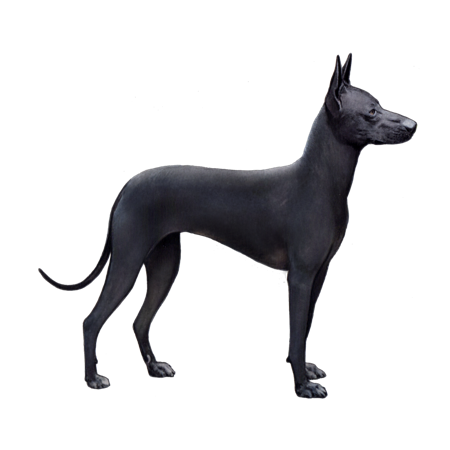
Chihuahua
Chihuahuas are the smallest dog breed in the world, but these tiny pups have big personalities and even bigger hearts. When properly socialized, Chihuahuas make for quirky, alert companions that are well-suited for living in apartments and small homes.
Interested in discovering if your dog is a Chihuahua?
Check out Wisdom Panel's DNA tests.

Chihuahua Traits
General Appearance
In addition to their small size, Chihuahuas have tall, upright ears and large, rounded eyes, compact bodies, short muzzles, and moderately long tails. Despite their tiny stature, they have muscular bodies.
Coat and Coloring
The Chihuahua's coat comes in two varieties: smooth-haired and long-haired. The smooth-haired Chihuahua's coat is short, smooth, and glossy. Some have undercoats made up of hair that is slightly longer. Smooth-haired Chihuahuas inherit their coats by carrying one or two copies of the dominant gene for short hair.
Long-haired Chihuahuas have longer coats that are silky and either smooth or slightly wavy. Often they have fringe around the ears and tail. Long-haired Chihuahuas inherit their coats by carrying two copies of the recessive gene for long hair. A Chihuahua's coat can come in almost all possible colors and patterns and may include dark masks, merle, and white markings.
Distinctive Physical Traits
There are two main types of Chihuahuas—apple head and deer head—though only the apple head adheres to AKC standards.
As the name suggests, apple head Chihuahuas have well-rounded, apple-shaped skulls. Deer head Chihuahuas have a longer, deer-like head with a more gradual slope where the muzzle joins the forehead. Deer heads typically have longer legs, larger ears, and tend to be larger in size.
The tail of the Chihuahua is set high and tapers as it reaches the tip. The carriage of the tail is an important trait—it's generally carried high and in a curved or semi-circular shape.
Chihuahua Temperament
The Chihuahua is an active, often playful dog with a big personality. They tend to bond closely with one or two people and will show those people great affection. Chihuahuas don't typically enjoy being left alone for long periods. Luckily, their small size makes them an easy breed to take on frequent outings.
If not properly socialized, Chihuahuas can be apprehensive and nervous around strangers or other dogs and pets. This may result in barking or even snapping when the dog feels anxious or threatened.
Chihuahuas can do well around children as long as kids aren't too rambunctious and are mindful not to scare these little pups. Very young children may struggle to keep their energy levels and movements subdued enough to make a Chihuahua feel safe.
House-breaking Chihuahuas can sometimes be challenging, requiring patience and more frequent potty breaks. Some Chihuahuas can be trained to use indoor potty areas.


Chihuahua History
Despite being one of the most well-known dog breeds today, the origins of the Chihuahua are a bit of a mystery. Some experts believe they once belonged to the ancient Mayans. The breed may have been the result of crossing the Techichi—a dog that played an important role in both the Toltec and Aztec cultures—and the Chinese Crested dog.
Though the ancient civilizations were eventually destroyed, the resilient breed survived in Chihuahua, Mexico. It came to the United States in the late 1800s when Americans visiting Mexico took an interest in the dogs and brought them back home as souvenirs from their trips.
As more of these dogs made their way to the U.S., they were called many names—including Arizona Dogs, Texas Dogs, and Mexican Dogs. However, the name "Chihuahua" is what eventually stuck.
The Chihuahua became an AKC-recognized breed in 1904. It now consistently enjoys a spot on the list of most popular dog breeds in the U.S.
Chihuahua Care
Nutrition
Chihuahuas require more calories per pound of bodyweight than larger dogs. Because their small stomachs don't allow them to eat large meals, it's best to feed them several small meals throughout the day to fulfill their caloric requirements. However, take care not to overfeed Chihuahuas. For such a small dog, even a couple extra treats can add up and lead to weight gain.
Chihuahuas should eat a diet created for small breed dogs (as well as their specific life stage). These diets will have the appropriate blend of nutrients and a smaller kibble size, allowing the tiny pups to properly chew and digest their food.
Grooming
Smooth-haired Chihuahuas need only occasional brushing due to their short, tidy coats. Long-haired Chihuahuas should be brushed at least weekly to prevent their coats from becoming tangled or matted.
All dogs require regular dental care, including at-home teeth brushing and professional dental cleanings. Chihuahuas are particularly susceptible to dental issues due to their small mouths and crowded teeth. So, they may require more frequent cleanings beginning at an early age.
Exercise
Though Chihuahuas are perfectly happy to curl up in their favorite person's lap, they do need daily exercise. However, they don't require long walks or rigorous physical activity.
Short, indoor play sessions are often enough to meet their exercise requirements. Still, for mental stimulation, Chihuahuas should be able to go outside, sniff, and explore. But keep in mind—unless they are confined to an area with other small dogs—Chihuahuas will likely be outmatched in size at dog parks.
Training
Chihuahuas have high intelligence and like to please their owners, making them a very trainable breed (and one that seems to enjoy performing entertaining tricks). However, they can be a bit stubborn and like to get their way. So, be prepared to remain firm and consistent during training sessions.
Chihuahuas respond well to reward-based training using treats or favorite toys.

Chihuahua Genetic Health Conditions
-
Chondrodystrophy (CDDY) and Intervertebral Disc Disease (IVDD) Risk
Chondrodystrophy (CDDY) is a skeletal disorder characterized by shortened limbs and abnormal early degeneration of the spinal discs, or intervertebral disc disease (IVDD), which predisposes to disc herniation.
-
Neuronal Ceroid Lipofuscinosis 7
Neuronal Ceroid Lipofuscinosis 7 (NCL7) is a progressive disease affecting behavior, movement, and vision, with a risk of epileptic seizures in later stages.
Knowing if your Chihuahua is a carrier or at-risk for these conditions can help you and your veterinarian plan for your pup’s lifelong care. With Wisdom Panel™ Premium, you can get results for over 200 genetic health tests.
Breed Group
Terrier
The Terrier Group ancestors were bred to hunt and kill vermin. They are often characterized as feisty and energetic dogs whose sizes range from fairly small to much larger.
Resources
https://vcahospitals.com/know-your-pet/dog-breeds/chihuahua-smooth-coat
http://www.fci.be/Nomenclature/Standards/218g09-en.pdf
https://vcahospitals.com/know-your-pet/dog-breeds/chihuahua-long
https://www.royalcanin.com/us/dogs/products/retail-products/small-adult-dry-dog-food
https://www.akc.org/dog-breeds/chihuahua/
https://www.chihuahuawardrobe.com/deer-head-vs-apple-head-chihuahua-whats-the-difference/
Reviewed July 26, 2020 by Cindy Elston, DVM, MPH





















































